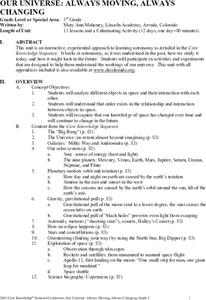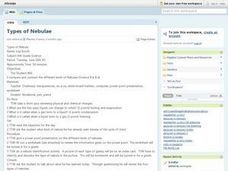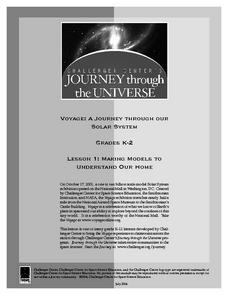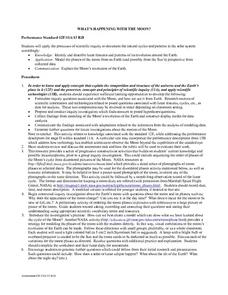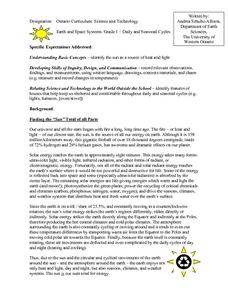University of Colorado
The Moons of Jupiter
Can you name the three planets with rings in our solar system? Everyone knows Saturn, many know Uranus, but most people are surprised to learn that Jupiter also has a ring. The third in a series of six teaches pupils what is around...
Curated OER
Teaching the Complexities of Earth's Systems
An understanding of systems is integral to the study of the Earth.
Curated OER
Glowing Glimpses of Our Universe
Students will complete hands-on space activities. In this space science activity, students will create a glow-in-the-dark model of the solar system, visit a planetarium, make star pictures, and paint constellations. Activities are meant...
Mr. E. Science
Stars, Galaxies and the Universe
It takes 225 million years for our sun to travel around the galaxy. The presentation covers astronomical units, light years, telescopes, types of stars, the life cycle of a star, and types of galaxies. This is the last lesson in a...
Curated OER
Our Universe: Always Moving, Always Changing
Students explore the main concepts of astronomy through the eleven lessons of this unit. The past, present, and future methods of studying the science are examined in this unit.
Curated OER
Spinning into Space
Students, through hands-on activities, teacher demonstrations, pictures, and informational books, complete a unit on the Earth and its place in the Universe. They make mobiles of the Milky Way and watch demonstrations of lunar and solar...
Curated OER
TE Lesson: Fighting Back!
Students examine the roles of the immune system in keeping the body healthy. They see how engineers contribute to this process by creating antibiotics, and vaccinations. They discuss how an astronauts' immune system may be suppressed...
Curated OER
Types Of Nebulae
Eighth graders explore the different types of nebulae that can be found in the solar system. They view a PowerPoint presentation about the material and identify each nebulae as it is presented. Students also discuss the life cycle of a...
Space Awareness
Measure the Solar Diameter
Scientists could measure the diameter of the sun before they knew its distance. Scholars construct a simple mirror box to measure the diameter for themselves. They compare this measurement with the official size, listed in a...
Curated OER
Making Models To Understand Our Home
Students investigate the concept of a model and how it is used to represent something that is real. They recognize how the model can be applied to other types of concepts like the solar system. Students create a scale drawing of a house...
Curated OER
Sun Shadow Cycles
High schoolers use diagrams to review how the Earth rotates around the sun. In groups, they use the same diagrams to explain how the sun shadows are produced and how they differ between seasons. They describe the Earth's rotation and...
Curated OER
What's Happening With the Moon?
High schoolers review the process of scientific inquiry. Using this information, they identify the patterns and cycles of the moon as it revolves around the Earth. In groups, they model the phases of the moon from the Earth and Sun's...
Curated OER
The Milky Way and Beyond
Students consider the scale of the Milky Way Galaxy. In this Milky Way lesson, students hypothesize the length of time necessary to cross the Milky Way.
Curated OER
Daily and Seasonal Cycles
First graders identify the sun as a source of heat and light. They identify features of houses that help keep use sheltered and comfortable throughout daily and seasonal cycles. Students are told that summer is the best season to...
Curated OER
History of Astronomy
Students participate in assessments regarding the history of astronomy. They listen and take notes, draw a time line, draw a solar sytem designed by Ptolemy and create flashcards. They write an essay on Galileo, watch a video, take a...
Curated OER
Up in the Sky
First graders associate events and objects with day or night. They create a word bank and use is as a reference to create sentences about the sun. They conduct sun-themed experiments and art projects.
Curated OER
Exploring the Interstellar Medium
Students investigate the Interstellar Medium and the Local Bubble that the Sun is inside. They read and discuss a handout, answer discussion questions, observe a demonstration of light scattering, and conduct an experiment on the...
Curated OER
Phases of the Moon
Students use a simple physical model of the Earth, sun, and moon to understand why the moon changes phases from the perspective of Earthly observers. They hold up balls representing the moon in a room with a single light source to see...
Curated OER
Solar System: Uranus
Students research Uranus and its geological formation, atmosphere, magnetic field, satellites, and rings.
Curated OER
The Great Planetary Debate
Students' are given a research sheet to complete in small groups. They are to select a planet or moon to research using the Internet. With this research and their completed form, each group defends their planet or moon in a debate...
Curated OER
Hubble Space Telescope
Students investigate the universe through the eyes of the Hubble space telescope. They conduct research from looking at the universe that is simulated with a digital projector. The images are projected onto the wall in a simulation of...
Space Awareness
Living in the Milky Way
Get to know our galaxy with an astronomy-themed, hands-on activity. Scholars watch an informative video, answer questions, and construct a model of the Milky Way in order to examine its contents and the distance inside it.
Laboratory for Atmospheric and Space Physics
The Planets and Scale
Scholars gain an insight into the relative size of planets and distance between inner and outer planets with the help of informational text, a data table, and a series of four questions.
University of Colorado
The Jovian System: A Scale Model
Jupiter has 67 moons! As the seventh in a series of 22, the exercise shows learners the size and scale of Jupiter and its Galilean moons through a model. They then arrange the model to show how probes orbited and gathered data.






